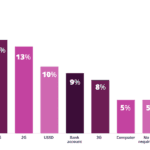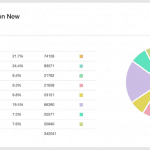FinTech’s Elephant Seal Problem
The unique mating ritual of elephant seals confers upon the colony’s strongest male the privilege of mating with almost every female. This honor is usually determined through combat, and often goes to the largest male. Most males then spend their lives growing as large as possible, ignoring the very real downsides – including the high incidence of crushing their female partners during mating and the higher likelihood of being eaten by sharks.
This ecosystem mirrors the world of fintech in that most companies are rewarded for audience size and spend their entire lifecycle in pursuit of more users. Most apps and companies choose a free business model to facilitate this growth, but then are locked in a downward spiral of more growth at the expense of their customers’ financial health.
The result is that in a world filled with hundreds of free financial tools at our fingertips, at least 36 percent of Americans still have $500 or less in savings (including retirement).
Our experience at Common Cents Lab – which is supported by the MetLife Foundation – has proven that there is a better way. Instead of focusing on removing impediments to growth, fintech founders that focus on removing impediments to positive financial behavior can build lasting, healthy and revenue-generating financial relationships with their customers.
Here are just two examples:
We partnered with EarnUp, a company that optimizes a user’s payment schedule to save thousands of dollars on debt interest, to identify ways we could help homeowners pay down their debt faster.
EarnUp removes one psychological barrier by making monthly budgeting easier: They sync a customer’s loan payment date with their payday. How could we further diminish psychological barriers and speed up repayment?
To figure this out we created a basic A/B email test on a random selection of EarnUp’s user base. We asked both conditions to start paying more than their minimum payment. In one condition we framed this request with psychologically pleasing numbers – round numbers. People were prompted to “round up” to an even number.
What happened?
Simply asking people to increase their mortgage payments led 10 percent of people from baseline to increase their mortgage payment by $60, saving them $8,000 in interest and decreasing their mortgage term by two years. But by making it easier and asking users to “round up,” the experiment increased the number of people who chose to overpay by 40 percent from baseline without changing the average savings.
This experiment achieved these outcomes without using financial incentives. In fact, EarnUp itself is not free. The firm charges an average $5-$10 fee per month.
Removing psychological barriers also proved successful for Payable, a fintech company that helps contractors get paid faster. Common Cents partnered with Payable to help the many 1099 contract workers who do not have access to retirement accounts like 401(k)s, enroll in one.
We again used a simple A/B email test. In one email we displayed the contractor’s income on a per-job basis and in another email we displayed the income on an annual basis. In both emails, we asked contractors if they would like to sign up for a retirement account.
What happened?
By framing a worker’s income on an annual basis, the intervention increased the number of people who clicked through to start saving for retirement with a third party by 14.5 percent more than the per-job frame. The bulk of these 1099 workers indicated that they wanted to save 12 percent to 20 percent of their income.
This intervention removed the psychological barrier of scarcity. We put people in a long-term mindset to encourage customers to save more for retirement.
Payable was able to prioritize helping their contractors save because it aligned with their (not-free) business model. The firm was paid a small referral fee for offering these retirement services, and in addition they charge companies for payment services provided to their contractors. Both help align the company’s growth with positive user outcomes.
Like EarnUp and Payable, many of the companies we partner with have abandoned the free model and are focused on removing the true psychological barriers to financial management. We hope that others continue to follow suit and avoid a similar fate to the elephant seals.
Kristen Berman is a co-founder of Duke’s Common Cents Lab, where Wendy De La Rosa is a co-founder and head of research.
Photo of elephant seals fighting courtesy of Amit Patel via Flickr
- Categories
- Technology



